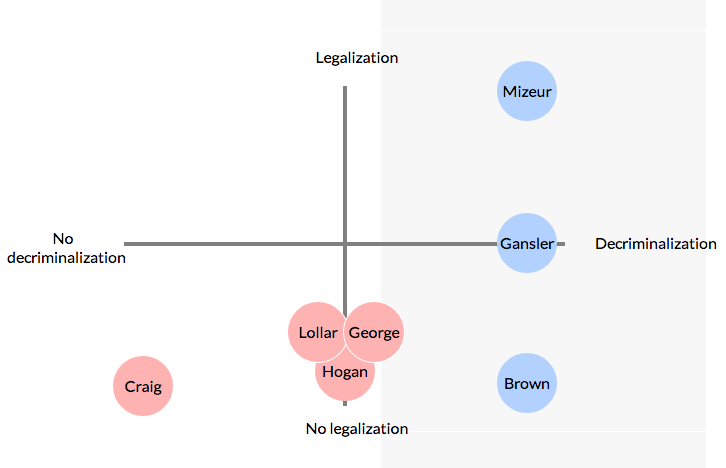ANNAPOLIS – The debate over Maryland’s marijuana laws took the state capital by storm this legislative session, and the issue seems poised to linger there into the future and during the governor’s race.

Gov. Martin O’Malley on Monday signed into law a measure that will make possession of small amounts of marijuana a civil rather than criminal offense starting Oct. 1.
The signing marked a shift in opinion by the governor, who had expressed opposition to decriminalization at the January start of the session.
A separate measure to legalize, tax and regulate marijuana died in committee.
While O’Malley has spoken out against legalizing marijuana for recreational use, the seven major candidates vying to replace him in 2015 expressed a broad range of views in response to a Capital News Service candidates’ questionnaire.
The only major candidate currently in support of legalization, Delegate Heather Mizeur, D-Montgomery, has touted her plan to regulate and tax marijuana and use the revenue to fund universal prekindergarten.
Mizeur also proposed legislation this session that would decriminalize small amounts of the drug, but said legalization would be a “top priority” for her administration if elected governor.

“In order to make our communities safer, keep marijuana out of the hands of children, and generate much needed revenue, we must expose this underground industry to the light of day by legalizing, regulating, and taxing marijuana,” she said.
Mizeur backed the legalization measure that was introduced this session by Sen. Jamie Raskin, D-Montgomery, and Delegate Curt Anderson, D-Baltimore.
But most of the focus this session remained on the decriminalization bill sponsored by Sen. Robert Zirkin, D-Baltimore County, and Sen. Allan Kittleman, R-Howard.
Democratic candidates Lt. Gov. Anthony Brown and Attorney General Doug Gansler both said they support decriminalization, citing the disproportionate number of marijuana-related arrests among minorities and the high costs for law enforcement and the state.
Gansler called the enforcement of Maryland’s marijuana possession laws “racially biased, ineffective, and a serious drain on state resources.”

“Our policy on simple marijuana possession costs Maryland millions to arrest, process, prosecute and imprison offenders,” he said. “Millions of dollars are being diverted to enforce [illegal] possession of marijuana when it would be a better use of public dollars if law enforcement could focus on violent crimes and preserving public safety.”
Brown, who also said those resources would be better spent on combating violent crime, added that he supports decriminalization because a criminal conviction for minor marijuana possession typically impairs a person’s ability to secure employment or affordable housing.
But Brown said that he does not support the legalization of marijuana at this time, as two western states have done.
“Colorado and Washington will provide an example of the socio-economic challenges and pitfalls to marijuana legalization,” he said. “We will learn from their experiences and assess whether additional changes to Maryland’s law are warranted.”

Gansler, who did not say directly whether he supported or opposed legalization, said that any decision on the matter should be based on the “the health and security” of Marylanders and “not on a rush to tax a new source of income to address budget pressures.”
All four major GOP candidates for governor expressed opposition to the legalization of marijuana for recreational purposes, but not all said they were fully closed off to the idea of decriminalization in responses submitted before the General Assembly passed the decriminalization measure on April 7.
Larry Hogan, an Anne Arundel County real estate broker and leader of the conservative advocacy group Change Maryland, echoed the sentiment that Maryland should look closely at other states’ experiences with decriminalization and legalization before moving to change any existing laws.
But Hogan said that he would “keep an open mind” on the state’s laws despite being currently opposed to legalization.

“Destroying someone’s chances of employment and exposing them to violent offenders because they possessed a small amount of marijuana seems unjust,” he said.
Gubernatorial candidate Delegate Ron George, R-Anne Arundel, said he would be open to measures that impose civil fines or diversion programs instead of “strict legal methods” for nonviolent drug offenders.
But he said he does not believe full legalization is the right course.
“I have a master’s degree in clinical psychology and am aware of the effects on the developing brain,” he said.
George added that he is concerned marijuana use would increase among young people.
Harford County Executive and Republican candidate David Craig expressed concerns about the message any changes would send about the “dangers of marijuana use.”

“We also have to consider the way it impacts our state as we attempt to poise ourselves as a cybersecurity, biotech, and defense mecca where top security clearances are required,” Craig said.
He questioned how health care issues would be affected if marijuana were legalized and said he does not support legalization or “full decriminalization” of the drug.
Charles County businessman and gubernatorial candidate Charles Lollar, a Republican, expressed concern about what he called “the widespread recreational use” of marijuana and the effects it has on users and their families. Lollar, like O’Malley, said he considers marijuana a gateway drug and is against its legalization for recreational purposes.
The state primary elections for the governor’s race are June 24.




You must be logged in to post a comment.